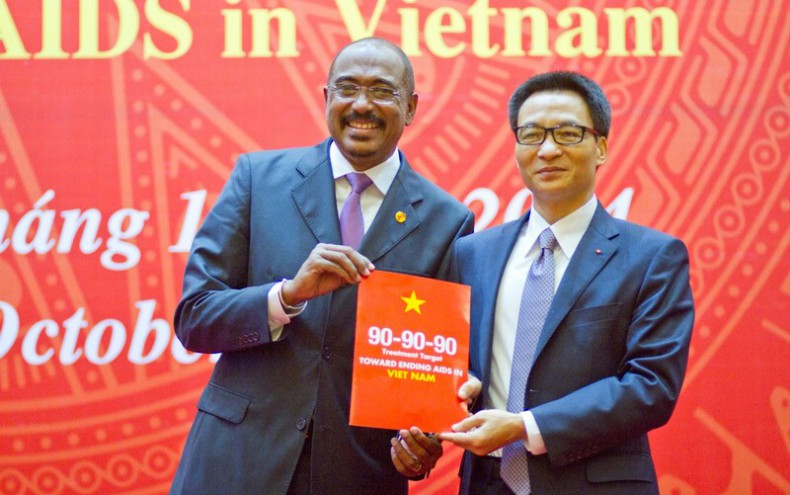Viet Nam commits to new HIV treatment targets
Ha Noi, 28 October 2014 – The Government of Viet Nam announced its commitment to new targets which will rapidly expand HIV treatment, thus becoming the first country in Asia to adopt the “90-90-90” targets.
UNAIDS Executive Director Michel Sidibé joined Deputy Prime Minister and Chair of the National Committee for AIDS, Drugs and Prostitution Prevention and Control, Vu Duc Dam, Minister of Health Dr Nguyen Thi Kim Tien and other senior government officials and development partners at the official launch of Viet Nam’s 90-90-90 targets in Ha Noi.
“Today, we have the 90-90-90 targets and we are looking forward to ending AIDS by 2030. With the support from the international community and Vietnamese society, we can achieve our goals,” said Mr. Dam.
Around the world, momentum is building to reach the 90-90-90 targets by 2020: 90% of people living with HIV will know their HIV status, 90% of people who know their status are on HIV treatment and 90% of all people on treatment will have undetectable levels of HIV in their body (known as viral suppression). Viet Nam’s commitment to these ambitious targets puts the country on course to end its AIDS epidemic by 2030.
“The ultimate payoff will be ending AIDS by 2030. It will be our greatest gift to the people of Viet Nam, to the world and to generations yet to come. It will be our lasting legacy,” said Mr. Sidibé.
There were 250,000 people living with HIV and 14,000 new HIV infections in Viet Nam in 2013, but it is estimated that only one-in-two people living with HIV knew their HIV status. As of June 2014, more than 87,000 people were receiving HIV treatment, a 30-fold increase since 2005, but that was only one-third of all people living with HIV. In addition, international donors who account for more than 70% of spending on fighting AIDS in the country are gradually withdrawing their financial support because Viet Nam’s strong economic growth has helped it attain “lower middle-income country” status.
To overcome the challenges it faces, the Ministry of Health has developed an Investment Case for optimizing Viet Nam’s HIV response. The Investment Case aims to improve the effectiveness, efficiency and sustainability of the national response as donors reduce their support. Scaling up HIV testing and treatment and achieving 90-90-90 by 2020 is one of the strategic priorities put forward by the Investment Case.
“We will employ concerted solutions and invest more to increase the number of people on treatment and increase the quality of the treatment. Viet Nam is determined to achieve these new HIV targets,” said Dr. Tien.




